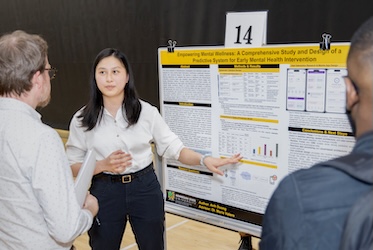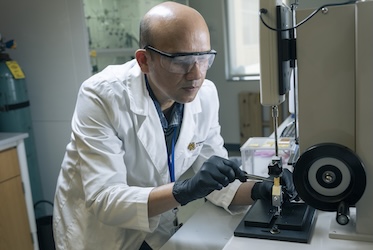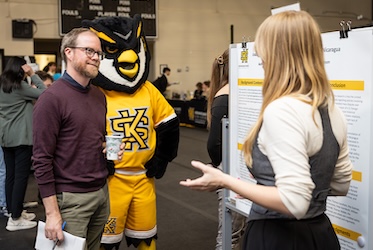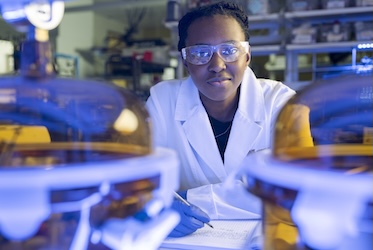
Kennesaw State professor finds purpose, inspiration in collaboration
KENNESAW, Ga. | May 23, 2022
Whether it’s helping with research designed to save bats from extinction or working with the theater department on a play about Bigfoot, Kennesaw State University biologist Thomas McElroy is a natural collaborator.

“I just mostly like the people I work with,” McElroy said. “I’m excited for them about what they’re excited about, and if I can help them and they can help me, then great. Let’s get to work.”
Over his 18 years at Kennesaw State, McElroy, an associate professor of biology who studies genetic variations in various populations, has been a go-to resource and valuable partner for faculty members throughout the College of Science and Mathematics and beyond. One of the reasons he came to work at KSU was the opportunity for collaboration with fellow faculty members.
In one such collaboration, associate professor of biology Eric Albrecht needed help to figure out why venom in adult and juvenile scorpions has different levels of toxicity, so he turned to McElroy, as have more than 20 researchers before him. In Albrecht’s case, he and McElroy pooled their resources in terms of funding, student assistants and laboratory processes for a published paper.
“DNA and RNA are everywhere,” McElroy said. “I can study seagrasses, scorpions, snakes, soil, and find variable genetic markers. A lot of people have different expertise, and this helps them expand their research projects to incorporate another level of questions, this time on a genetic level.”
Albrecht said he sought out McElroy’s expertise on ecological genetics for that reason – to take the acquired knowledge to a deeper level. McElroy also helped secure internal funding, guide student work on the study and write the manuscript that ultimately was published. Albrecht and McElroy stressed the importance of collaborations resulting from everyday encounters.
“Most internal collaborations develop through conversation and similar research interests, and often one faculty member pursues a partnership with another,” Albrecht said. “In all collaborations, the faculty have to work at the same pace, have the same goals, have critical expertise and get along personally. That’s why I chose to work with Thom.”
That’s all in a day’s work for McElroy. He has helped with research into white-nose syndrome among bats, how urbanization affects stream water quality, and how switchgrass can help mitigate lead-poisoned soil. He even collaborated with the theater department on a series of short plays about de-extinction and the origins of Bigfoot.
In addition to working with a wide range of faculty members, McElroy said he enjoys the teaching aspect of his job as well — another type of collaboration. He has mentored scores of students in both undergraduate and graduate research, which he says is the most satisfying aspect of his job.

An avid musician, McElroy said he sees teaching as its own kind of performance and tries to convey that enthusiasm to his students, whether guiding their lab work or speaking on the day’s topic.
“Encouraging students to be curious and want to learn is a big part of my job. This is where scientists come from, so I hope I can help them be enthusiastic about science,” McElroy said. “Because their success is our success, and that’s very important to me.”
– Dave Shelles
Photos by David Caselli
Related Stories

Passions spark innovation at Kennesaw State Symposium of Student Scholars

Kennesaw State researcher tackling sustainability through use of transparent wood

Kennesaw State students to present research at Symposium of Student Scholars

Chemistry student engaged in sustainable catalyst research through Kennesaw State's First-Year Scholars program
A leader in innovative teaching and learning, Kennesaw State University offers undergraduate, graduate, and doctoral degrees to its more than 47,000 students. Kennesaw State is a member of the University System of Georgia with 11 academic colleges. The university’s vibrant campus culture, diverse population, strong global ties, and entrepreneurial spirit draw students from throughout the country and the world. Kennesaw State is a Carnegie-designated doctoral research institution (R2), placing it among an elite group of only 8 percent of U.S. colleges and universities with an R1 or R2 status. For more information, visit kennesaw.edu.















